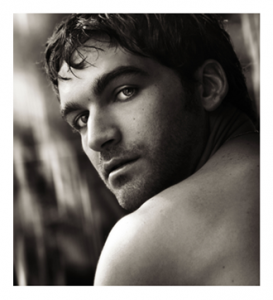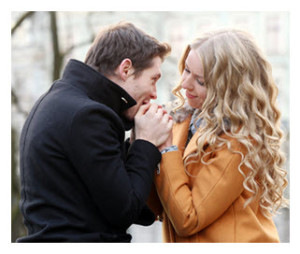Loving our children? That’s easy. We feel an instinctive bond and usually, an unconditional one. But why do we love the romantic partners who come into our lives — some of whom are with us forever, and others for an interlude and its lessons? Does it help us to know the reasons for our decisions to pair up with the people we choose — or who choose us?
 Allow me a little story to illustrate the enigma of chemistry and connection.
Allow me a little story to illustrate the enigma of chemistry and connection.
A Great Catch… For Someone Else
He was a hunk. Gregarious. Smart as a whip. He was a grad student at one of the finest universities in the world, and an occasional visitor around my mother’s dinner table during my college years. Though she might have hoped the two of us would hit it off, I was far from “romance ready” at the time. I found him attractive but was not “attracted,” and… he had his eye on someone else.
The young man in question wound up falling for a woman I never got to know very well. However, my mother was cool to her in person and disparaged her in private. Since she felt maternal and protective of him, I doubt any woman would have seemed good enough, and this woman (whom he married) certainly did not.
She, too, was extremely smart. She was also eight years his senior, and while perfectly fine looking, not a beauty by the standards of the day. As for him, he had a magnetic personality, easily drawing people to him. She, on the other hand, appeared entirely comfortable in the background.
These differences aside, or perhaps in part because of them, this duo always seemed well suited and happy on those occasions over the years when we all met.
Why Do We Love the People We Love?
So why do we love the people we love? Is it for the ways in which we are opposites or alike? For the ways in which our insecurities are bolstered and our failings are compensated? Is it pure animal attraction when we’re younger (and the drive to mate), or something more? Is it convenience, timing, or both? Do we fall in love with love itself, with the fact that he or she looks good on paper, or the potential that we see in a prospective mate?
 Thinking of those couples who go through incredible obstacles together and come out the other side, I find myself marveling at individuals with the foresight, the courage, the tenderness, the commitment and the faith to love each other at their lowest as well as at their best.
Thinking of those couples who go through incredible obstacles together and come out the other side, I find myself marveling at individuals with the foresight, the courage, the tenderness, the commitment and the faith to love each other at their lowest as well as at their best.
I wonder about the aspects of personality, values and pragmatic factors that contribute to riding out a storm. I am even more astonished (and impressed) by those who embark on love relationships aware of preexisting challenges.
What makes them more accepting of others in their volatility, diversity, and imperfection?
Theories of Love?
There are numerous angles and theories on love — what it is, what it means, why and how attraction kicks in, how we identify and overcome its obstacles, and what enables us to sustain its glories.
Among other explanations, Psychology Today presents one of the more frequently cited — the “Triangular Theory of Love” — as follows:
… Love consists of three components — intimacy (emotional closeness), passion (sexual and romantic attraction), and commitment. The ideal love for a romantic couple (consummate love) involves all three…
That’s all very nice, but we know that getting there isn’t easy. Besides, this three-prong framework looks different for each couple, and different again over time. And let’s remember that there really is no “there” there — no relationship is static, and nor do any of us exist in a bubble. Intimacy, passion and romance don’t look the same in Year 5 and Year 25!
“Reactive” Love
I have a theory of my own, based on the way we adapt and apply lessons from previous experience and “react” by opting for more or less of the same. Not the typical “chain reaction,” we are consciously or unconsciously shifting our choices based on what feels good and suits our needs.
For example, after my marriage to a man who was very aggressive in his argumentation — a “my way or the highway” kind of guy — the first man I fell for after my divorce (some years later) was extraordinarily gentle, bordering on shy. No slouch in the smarts department, he nonetheless had a less adversarial approach to any communication. I readily said goodbye to some of the traits I once admired in my ex in order to bask in the sensitivity of my new man.
Not only was our time together happy and healing, but I was able to “tinker” again with my own understanding of how much of the Alpha male I needed, wanted, and felt comfortable offsetting. I brought this awareness into the next serious relationship that came along a few years after that.
Over the course of my life, other examples of tweaking what I sought in another person touch on both values and behaviors including the importance of sexual playfulness, common political beliefs, and likewise, the role of money in the relationship.
 Ah, the Rosy Glow…
Ah, the Rosy Glow…
Naturally, when everything is smooth sailing, we don’t question our good fortune — love given and love returned, in all its finery.
But when “real life” starts dropping obstacles in our path, then what? How do we keep the good feelings alive?
Can we really reduce love to a cellular level? Should we even try? Do we only try when we’re lonely, when we’ve been through a crushing disappointment, when the relationship shows signs of running out of steam, or when we’re vulnerable in other areas of life?
How do we explain the man who swears he will never marry, who then meets someone at 50 and three months later is walking down the aisle? What about the high school sweethearts who reunite after disastrous marriages, rekindling romance 30 years later? Is it the person or is it timing? Is it a matter of needs finally met, or possibly, lesser needs abandoned?
What We Want, What We Need
While I may not believe that timing is “everything,” it’s undoubtedly significant. There’s little question that we may find ourselves ripe for love at a certain age, stage, or in a new emotional state — from first love at 17 to “the marrying kind” at 27. Or, we welcome love after empty nest at 50, or 15 years later, much to our surprise.
Why we even try to explain the ways of the heart is itself puzzle, unless perhaps it is to duplicate love lost, or to ratchet up the probability that we can find it when we are finally in a position to give ourselves over to its exquisite contradictions — without giving ourselves away.
Could it be that we learn to trade our idealized version of a great relationship for something compromised yet still good? What allows some to reach this stage while others cling to the concept of a storybook union — and won’t accept anything else?
These questions may have no definitive answers, though I pose them to better understand my own past, present, and possible future; to be a better parent to my sons with regard to their romantic choices; and to come to grips with why and how the machinery of passion and wholehearted regard alter, and then, sadly, abandon us.
Love Is Learned? Maybe…
 Some say love is learned, but that’s a remark that strikes me as a sound bite, rather than a sound piece of advice or observation.
Some say love is learned, but that’s a remark that strikes me as a sound bite, rather than a sound piece of advice or observation.
Sure, we can learn to admire and respect a partner, but what about the “je ne sais quoi?” Or do we toss that out altogether?
As for getting “good” at love, that is learned, isn’t it? Aren’t patience, tolerance, and communication skills useful tools that serve the art of loving?
Don’t we acquire behaviors and emotional maturity that we hone and put into practice over time?
Character ought to be part of the mix, too, don’t you think? Loyalty, compassion, conviction, a sense of right and wrong — these are attributes I require in friends, so of course I require them in love, having learned that without them, love won’t last.
Then there is the heroic as I see it — the day in, day out nature of putting the other first when he or she is in need; advocating for and supporting the one we love.
A Good Match vs. Any Match
So how can we know if the object of our affections — or possibly, obsessions — is a good match for the long run?
We can observe, we can listen to our gut, we can seek the counsel of others. We can ask the person we love — this too takes courage — if we want to be reassured that they consider it a good match.
We can assess who we are and where we are in concert with who they are and where they are, and then look pragmatically at our collective needs. Still, without a crystal ball, even taking time — a great deal of time — isn’t love always a crap shoot?
This Quora topic on unrequited love raises a troubling issue that is all too common: We often fall for people because they’ve fallen for us. Some core of unworthiness or external pressure convinces us we are ‘lucky’ to have them, as we create ourselves a state of reciprocal infatuation and more… ignoring the missing aspects of a good match.
The same thread spells out the dilemma with this quote from a film: “We love the ones we think we deserve.” Wouldn’t we do well to imagine ourselves fully deserving of a respectful, substantive, caring and passionate match — whatever its apparent mysteries to the outside world — or even to ourselves?
Do you know why you love the people who mean the most to you in life?
You May Also Enjoy
There is NO why………..it is JUST THERE.
I feel it.
🙂
I agree with the Vintage Contessa, as the basis for the passionate love I feel for my husband. The intimate love and the commitment to love, however, have grown over the 42 years we’ve known each other, as we have entered into new dimensions of trust, admiration, respect for individuality and the mutual adventure of creating and sustaining a family. He is not only my lover but my very best friend, and we both want to be, and are committed to being, spouses for life. All of this provides a rock-solid base upon which to weather the inevitable challenges.
I have asked myself that very question many times over the past two years. Even being married for 20+ years does not shield one from obstacles that life drops in your path. My wife and I have been to the ‘edge’ twice in the past two years; each of us pushing for divorce at different times with a 3-month separation thrown in. Add a failed business venture that did serious L/T financial damage with a year of cancer treatment and job loss into the mix and your love gets tested.
I think the ‘Triangular Theory of Love’ is true. You need all three from my POV. The intimacy is that ‘learned’ love that allows you and your partner to flow and dance with each other. The little things that connect you such as bringing coffee in the morning, taking the outside of the sidewalk or extending your arm unconsciously reinforces it. The commitment must be there and you hope that both of you share a similar moral compass that guides you through good times and bad.
For me, passion is the most important. It may sound shallow, but you cannot have intimacy and commitment without ‘the want’. If you do not want that person in a romantic and sexual way, the other points never mature. I cannot go a day without touching, kissing or physically connecting with my wife. It was the one constant throughout our recent struggles. It is ‘glue’ that she has taken for granted at times as well as come to not only love, but also need. If it is not there, she begins to wonder what is wrong. This is something other women I know also feel. One 45 year old friend of mine talks of her L/T boyfriend as always grabbing and kissing on her; he has a high sex drive like me. While she gets annoyed with it at times, she wouldn’t give it up for anything.
You asked if it is the person or timing…I believe one can find love at any age. I also believe that if you romantically and emotionally connect with someone, you store it in the memory of your heart and brain. It never goes away. That is why people will marry a long lost love or high school sweetheart. The connection is always there. It may have been dormant, but the virus that infused you with passion for that person is in you forever.
I will always love my wife, deeply. Who knows what the future holds. My love for her has been imprinted in my DNA and that will never die.
I met her three years ago – while working in Argentina. The moment we met, it was as if we had known each other all our lives. We talked for hours the first night as the connection was obvious. We became inseparable, dining every night, taking long walks, going for runs in the hills, I even taught her how to fly fish. One would say it would be absurd to see two 47 year old kids lost in each other. It begs to add that the sexual attraction was off the charts. We made passionate love, had primal sex and my urge to be with her was unnatural in my mind – making love 3-5 times a day was common place by then (for years I thought I was becoming impotent). But I fell in love. I felt wanted, I felt needed. Her tender voice inspired me. I long for her to sleep on my chest as she did for the two years we were together. I had to leave and she couldn’t come with me. After continuing a long distance (chatting via video, emails and text) relationship for a year, I kept my promise of being with her for my 50th birthday. Our last goodbye was crushing to me. It’s been 10 months since I last saw her, with only two very long and introspective love letters professing an undying love for one another between us. I love her the way I do because of that familiarity I felt when we met. That urge to be with her. The way I felt around her. Loved. Needed. Wanted. Yes, there is an underlying psychological reason (I have come to recognize) for the way I feel. And I understand that is the answer to this topic (in my case). Incidentally, I came across this website as I tried to make sense of what I’ve been feeling and ultimately missing.
My most immediate response — how wonderful to have experienced this kind of deep connection. And of course, your sense of loss must be profound.